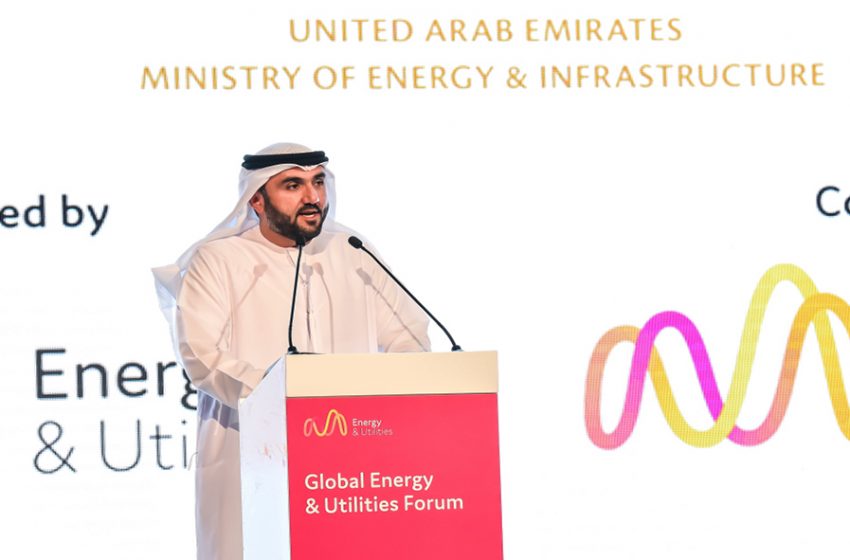UAE determined to lead the decarbonisation and sustainability of the fossil fuel sector

- H.E. Yousif Al Ali, Assistant Undersecretary for the Electricity, Water and Future Energy Sector at the UAE Ministry of Energy and Infrastructure, reiterated the key role of hydrogen in the country’s future energy system at Middle East Energy
- ADNOC aims to decrease greenhouse emissions intensity by around 25% by 2030 and expand their carbon capture capacity by almost 500%
- Hydrogen opportunity, energy investments and UAE’s roadmap to decarbonisation key topics of discussion at Middle East Energy 2022 Global Energy & Utility Forum
Dubai, United Arab Emirates, 7 March 2022: H.E. Yousif Al Ali, Assistant Undersecretary for the Electricity, Water and Future Energy Sector at the UAE Ministry of Energy and Infrastructure, has reiterated the UAE’s commitment to supporting the energy transition through domestic and foreign investment with an investment of $163 billion to diversify the country’s energy mix.
Speaking during the opening session of the Global Energy & Utilities Forum, taking place live and in person at Middle East Energy 2022 from 7 – 9 March at the Dubai World Trade Centre, H.E. Yousif Al Ali said: “With IRENA forecasting that energy transition investments will have to increase by 30% over planned investment to a total of $131 trillion between now and 2050, the UAE is committed to supporting this transition through domestic and foreign investment. To achieve our ambition, we plan to invest $163 billion to diversify our energy mix.”
Over the next decade, the UAE will focus on driving clean electrification through solar and nuclear, implementation of transparent policies, improving energy efficiency, reducing carbon and methane emissions, and turbocharging innovation to commercialise hydrogen technology and accompany these actions by strategies to unlock capital flows in support of clean energy transition to ensure affordability and reliability.
“Hydrogen has a key role to play in the energy transition and the UAE’s future energy system and will be crucial to decoarbonise our industries, transportation sector, and the fossil fuel sector. The UAE is determined to lead the decarbonisation and sustainability of the fossil fuel sector. Our national oil company ADNOC aims to decrease greenhouse emissions intensity by around 25% by 2030 and expand their carbon capture capacity by almost 500%, reinforcing ADNOC’s position as one of the least carbon-intensive producers globally.”
Addressing the audience this morning during her keynote address, H.E. Aisha Al Abdooli, Acting Assistant Undersecretary for Green Development & Climate Change, Ministry of Climate Change & Environment, discussed the UAE’s roadmap to green development and net-zero goals and highlighted that the Ministry of Climate Change & Environment is guided by various national plans and strategies such as the UAE Clean Agenda 2030, the UAE National Climate Change plan 2050 all of which support efforts to mitigate and adapt to climate change and support the achievement of net zero emissions by 2050.
Elsewhere on the agenda on the opening day were high-level panel discussions and presentations, including the Roadmap the Decarbonisation led by Ras Al Khaimah Municipality’s Executive Director of Energy Efficiency & Renewables, Andrea Di Gregorio, which focused on top-level strategies and approaches being adopted across the region to deliver on energy transition targets including the role of policy, regulation, and regional and international cooperation.
Delegates at the Global Energies & Utilities Forum also took part in a fireside chat with Cornelius Matthes, CEO of Dii Desert Energy, who introduced the MENA Hydrogen Alliance and outlined the potential for green hydrogen in the region.
Following on from this and rounding out the panel discussions on day one was a discussion on The MENA Green Hydrogen Opportunity highlighting that with a recent report stating that green hydrogen could stimulate $200billion of revenue in the GCC alone by 2050, there is the potential for the region to emerge as a global hub for green hydrogen.
With the International Renewable Energy Agency (IRENA) estimating that energy transition technologies will require investments of around $131 trillion by 2050, the Global Energy & utilities Forum continues tomorrow (Tuesday 8th March) with a keynote discussion highlighting where the capital will come from to deliver on ambitious renewable energy projects and energy efficiency programmes. On the Forum’s final day (Wednesday 9th March), delegates at the keynote panel session will learn about the strategies and technologies for reducing CO2 within carbon-intensive industries.
Held under the patronage of H.H. Sheikh Maktoum bin Mohammed bin Rashid Al Maktoum, Deputy Ruler of Dubai, and hosted by the UAE Ministry of Energy & Infrastructure, over 18,000 attendees and 500 exhibitors from 131 countries are expected during the three-day energy showcase which is taking place live and in person from 7-9 March at the Dubai World Trade Centre.
To register for the 2022 event, please visit https://www.middleeast-energy.com/en/home.html.







